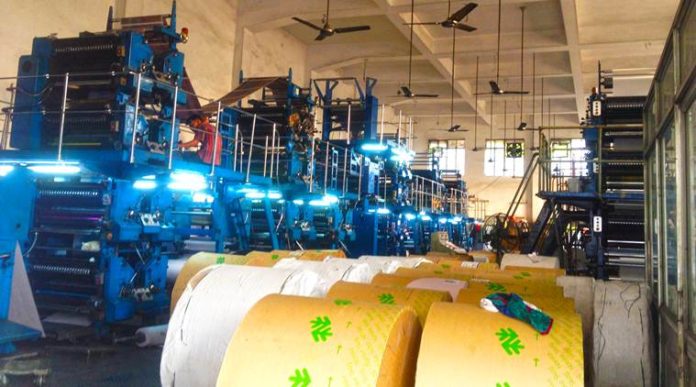New Delhi (NVI): India’s GDP is expected to contract by 8 per cent in financial year 2020-21 and is likely to grow by 9.6 per cent in 2021-22, as per the latest round of FICCI’s Economic Outlook Survey.
The median growth forecast for agriculture and allied activities has been put at 3.5% for 2020-21, says the FICCI survey.
“Agriculture sector has exhibited significant resilience in the face of the pandemic. Higher rabi acreage, good monsoons, higher reservoir levels and strong growth in tractor sales indicate continued buoyancy in the sector,” FICCI said in its survey report.
The present round of FICCI’s Economic Outlook Survey was conducted in the month of January 2021 and drew responses from leading economists representing industry, banking and financial services sector.
As per the survey, industry and services sector, which were most severely hit due to the pandemic induced economic fallout, are expected to contract by (-) 10.0% and (-) 9.2% respectively during 2020-21.
The industrial recovery is gaining traction, but the growth is still not broad-based. The consumption activity did spur during the festive season as a result of pent-up demand built during the lockdown but sustaining it is important going ahead, FICCI said in its report.
Also, some of the contact intensive service sectors like tourism, hospitality, entertainment, education, and health sector are yet to see normalcy, it said.
Apart from that, the quarterly median forecasts indicate GDP growth to contract by (-) 1.3% in the third quarter of 2020-21. The growth is expected to be in the positive terrain by the fourth quarter with a projection of 0.5% growth.
Further, on the estimates of other macro parameters, the participants put the median growth forecast for IIP at (-) 10.7% for the year 2020-21, with a minimum and maximum range of (-) 12.5% and (-) 9.5% respectively. WPI based inflation rate is projected to be flat in 2020-21.
On the other hand, CPI-based inflation has a median forecast of 6.5% for 2020-21, with a minimum and maximum range of 5.8% and 6.6% respectively. The latest retail inflation numbers do report some softening on back of a fall in prices of food items, especially vegetables.
On the fiscal front, a slippage is imminent this year and the median estimate for fiscal deficit to GDP ratio was put at 7.4% for 2020-21 by the participants – with a minimum and maximum range of 7.0% and 8.5% respectively. Fiscal deficit for 2020-21 was budgeted at 3.5%.
In addition, the participating economists were asked to share their views on certain contemporary subjects as well especially on the major global and domestic trends that will define 2021 and their expectations from the forthcoming Union Budget 2021-22.
Participants of the survey expect the economy to perform much better and have projected a median GDP growth rate of 9.6% for the financial year 2021-22.
The strong rebound in growth will be supported by a favorable base as economic activity normalizes post the sharp pandemic led contraction. The minimum and maximum growth estimate was forecasted at 7.5% and 12.5% respectively, as per the findings.
Participating economists listed out a string of important trends that could take shape in 2021. On the domestic front, respondents believed that the government’s big push to manufacturing in the form of a series of announcements as a part of the Atmanirbhar Bharat Package is likely to bear fruits from 2021 onwards.
The Production Linked Incentive Scheme with proposed incentives of around Rs. 1.45 lakh crores for five years is a big development, as per the economists. This along with continuous efforts on easing the business environment, keenness on improving national infrastructure is likely to set the stage for India to become a manufacturing hub.
Economists participating in the survey also believed that improvement in personal consumption is highly contingent upon successful administration of the COVID-19 vaccine.
The respondents believed that large scale global vaccination programme against COVID-19 and gradual normalization and recovery of the world economy will be the highlight of the year 2021.
In addition, respondents to the survey emphasized that geo-politics and the resultant impact on trade flows will be keenly looked at especially given the change in the US administration in January 2021.
Participating economists indicated that as the world commences mass vaccination drive to fight the pandemic, focus of policy makers will now shift towards the next big challenge at hand, preserving the environment and addressing climate change.
On expectations from Union Budget 2021-22, a majority of the participating economists suggested increased public expenditure on building infrastructure. They suggested that the government restructure its expenditure in favour of capital spending (in roads, railways, urban and rural infrastructure, housing) along with providing a clear roadmap and financing plans of the National Infrastructure Pipeline announced in the latter part of 2019.
They suggested that there is need for continuous focus towards ease of doing business while simultaneously reducing the cost of doing business in India.
A relief package for the services industry particularly those which were most impacted/continue to be deeply impacted by the pandemic including travel & tourism, hospitality, transport, education and healthcare sectors. Economists have called for increased budget allocation for critical social sectors such as health and education given the current situation.
Agriculture and allied activities sector require continuous focus with consolidation of reforms. Spending on creation of agriculture infrastructure must be expedited which would result in enhanced capacity of cold storage and warehousing facilities in the country. Allocation of additional funds towards food processing schemes along with incentives for agri-exports, according to the participating economists.
Apart from that, employment creation and consumption revival remain the key areas for ensuring a sustainable turnaround in economic prospects. Therefore, they called upon the government to announce temporary fiscal stimulus to support consumption in the form of income tax breaks or direct income transfers.
To ease the employment situation in both rural as well as urban areas, greater budget allocations to MGNREGA along with introduction of an urban employment guarantee scheme similar to its rural equivalent.
Adequate recapitalization of public sector banks is also required and should be included in the upcoming budget, they said.
-ARK







